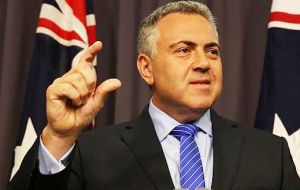MercoPress. South Atlantic News Agency
Australia scraps contested mining tax; major win for Abbot's conservatives
 “The mining tax is now gone,” Treasurer Joe Hockey told parliament after the Senate, where minor parties hold the balance of power, voted 36 to 33 for repeal
“The mining tax is now gone,” Treasurer Joe Hockey told parliament after the Senate, where minor parties hold the balance of power, voted 36 to 33 for repeal  Scrapping the tax was made possible after a deal struck with minor parties led by the Palmer United Party, whose powerbroker leader is a coal magnate.
Scrapping the tax was made possible after a deal struck with minor parties led by the Palmer United Party, whose powerbroker leader is a coal magnate.  “How is it possible that you can have a coal billionaire voting to vote down a mining tax?”, protested Christine Milne from the Green party
“How is it possible that you can have a coal billionaire voting to vote down a mining tax?”, protested Christine Milne from the Green party Australia on Tuesday agreed to scrap a contested resources profits tax after the government struck a surprise deal with crossbench senators, including mining tycoon Clive Palmer. The Minerals Resource Rent Tax (MRRT) was introduced by the previous Labor administration in 2012, with a levy on annual profits above 70 million dollars on iron ore and coal at a rate of 30%.
It was intended to return a share of the spoils of Australia's decade-long mining boom to government coffers but was widely criticized after its revenues fell dramatically short of forecasts.
“The mining tax is now gone,” triumphant Treasurer Joe Hockey told parliament after the Senate, where minor parties hold the balance of power, voted 36 to 33 for its repeal, a key election promise of the Tony Abbott-led conservatives.
It now heads to the lower house where it is guaranteed passage as the government has the numbers to push it through.
“We said we'd get rid of the mining tax; we've delivered in full,” added Hockey. “The tax package was so poorly designed, it was in fact costing the government billions of dollars each year.”
The tax regime was initially watered down after a furious publicity campaign by BHP Billiton, Rio Tinto and Fortescue, which contributed to the prime minister Kevin Rudd being ousted by his deputy Julia Gillard in 2010 as opinion poll ratings plunged.
The big miners claimed the tax hurt their competitiveness and affected investment.
The Labor government originally estimated that the levy would raise 3 billion Australian dollars in its first year of operation and Aus9.0bn in 2013-14.
That was drastically scaled back and according to the 2013 budget the MRRT raised just Aus200 million in the 2013 financial year and was forecast to bring in Aus700 million in the 12 months to June 30, 2014.
Scrapping the tax was made possible after the government struck a deal with minor parties led by the Palmer United Party, whose powerbroker leader is a coal magnate.
Palmer always wanted the tax gone but said he would not support a repeal unless crucial initiatives to assist families -- which were threatened by budget cuts -- were left unchanged. A compromise was reached.
Greens party leader Christine Milne said the deal was a win for the big miners and for the flamboyant Palmer, who last month issued an apology after outraging Beijing by calling China's leaders “mongrels” who “shoot their own people”.
“If ever there is a conflict of interest, it is this one,” she told the Senate.
“How is it possible that you can have a coal billionaire voting to vote down a mining tax?”
Palmer insisted the move made no difference to his coal mining interests in Queensland state, saying he was “retired” and was no longer chairman of any company.
“We all pay tax. Does that mean that members of parliament don't vote on income tax bills?” he told reporters.
Dumping the tax is a major win for Abbott and follows his victory in July when he succeeded in abolishing a divisive carbon levy after years of vexed political debate.
Finance Minister Mattias Cormann said the deal would benefit the economy, which is heavily dependent on mining. “A strong mining industry... is good for Australia, good for the economy and it's an important part of generating more jobs,” he said.




Top Comments
Disclaimer & comment rules-

-

Read all commentsI wish I could bitch about my tax and get it scrapped!
Sep 03rd, 2014 - 12:37 pm 0It was an ill-conceived law and poorly timed as well. They rushed it through without considering all the implications - not the least of which included taking on BHP & Rio Tinto.
Sep 04th, 2014 - 06:42 am 0By the time it became law the mining companies were spending lots of money on infrastructure and other investments which, combined with lower profits, meant much lower tax receipts. And then came the Carbon Tax. And now we have a buffoon - Palmer - holding the balance of power. I'm sure there's a moral somewhere in all of this...
Commenting for this story is now closed.
If you have a Facebook account, become a fan and comment on our Facebook Page!